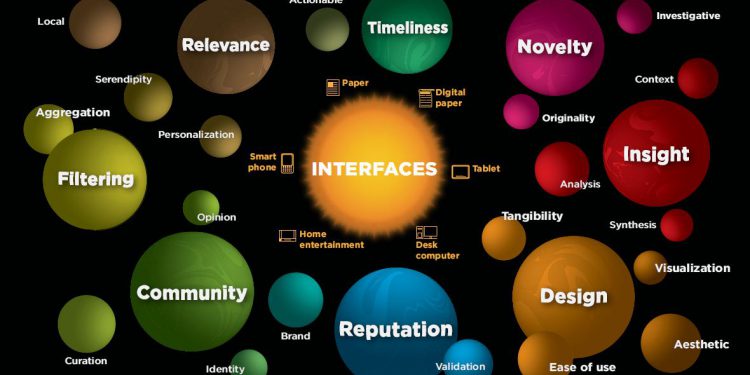Journalism has a rich future. In some ways it will be very similar to its rich and illustrious past. In others it will be very different, reflecting the current fragmentation and restructuring of the world of news. Among other shifts, journalism will encompass not just words, but also images, data, video, visualisations and more.
Reflecting this, our NewsScape visual shows where the greatest value will reside in a post-channel media world, in which news flows far beyond its traditional structures. There are eight aspects of news that its audience will value, be prepared to pay for, and that will provide a viable financial foundation for quality journalism in the emerging media environment.
At the centre of the NewsScape is the proliferation of interfaces through which news flows. Today journalists are generating content not just for single established channels, but for multiple, constantly evolving formats.
Timeliness is becoming ever-more important in a world ravenous for immediacy. The reality is that today the first to witness and broadcast news are usually not professional journalists. However the recent explosion in the number of non-professional news sources makes journalists more important in other ways.
Novelty, in uncovering newsworthy stories, remains as critical as ever, reinforcing the importance of traditional journalism. Investigative reporting will retain a central role in society. Increasingly this will involve data analysis, and often harnessing information and insights provided by many citizens.
Insight, through adding context, analysis, and synthesis to news, is where some of the greatest value lies, particularly in business and political journalism. Those who can provide this insight, be they domain experts or journalists with the requisite breadth of experience, will always have a bright future.
Design is moving to the fore everywhere, not least in how we consume information. The skills required to present information, ideas and data in a visual and highly aesthetic format will shift far closer to the heart of what it is to be a journalist.
Reputation becomes even more important in a world of unfettered information production. We will have context-specific measures for the reputation of both publications and individual journalists, enabling their audience to decide whether to place credence in their views.
Community will shift to the centre of media revenue models, meaning that journalists will need to understand and engage well with communities of news consumers, often enlisting their assistance to curate as well as contribute to news reporting.
Filtering is the classic function of editors. However that is receiving significant competition from personalized news selection driven by social curation. In addition, the reality is that many news users will look to news aggregators rather than single publishers for their hourly fix. This means journalists need to understand how social curation works, enabling their work to become visible far beyond the usual readers of their masthead.
Relevance relates news to individuals or small groups of readers, often through personalisation and localisation. Journalists will provide value through a deep understanding of focused groups, the issues they face and the decisions they need to make.
Those journalists and publishers who recognise where value resides in the emerging landscape of news will prosper themselves, and create many-faceted wealth for us all.
Ross Dawson is globally recognised as a leading media futurist, keynote speaker and author. His blog Trends in the Living Networks is ranked as one of the world’s top business blogs.












